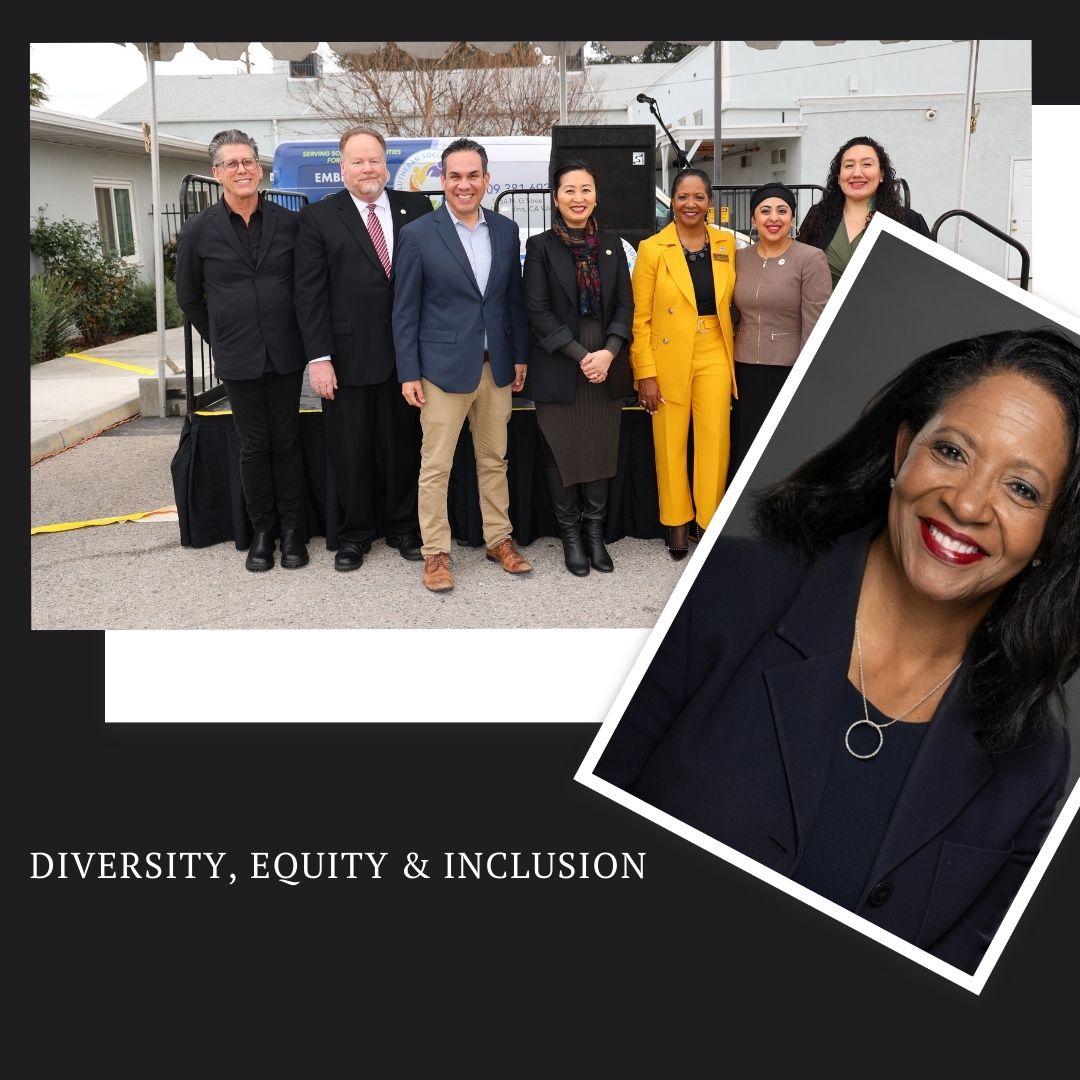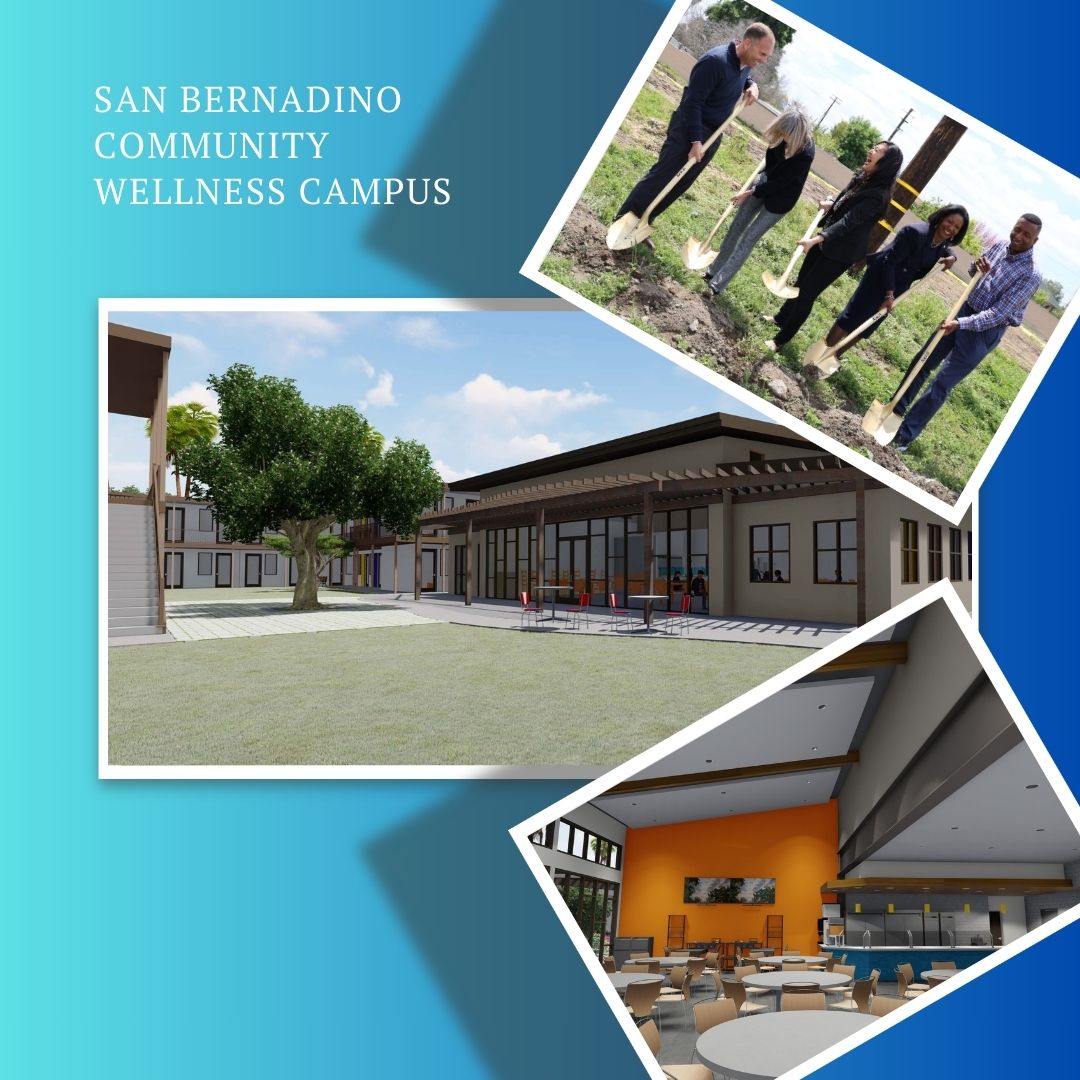Lutheran Social Services of Southern California is celebrating 80 years of providing faith-based social services to homeless and at-risk individuals. Under the leadership of CEO, Dr. Lashanda Beckwith, the nonprofit organization served more than 50,000 meals and food last year alone, and more than 1,200 people were helped with housing insecurity. More than 5,000 people were provided mental health services. In addition, LSSSC has a 100% graduation rate through their high school and college prep courses. And 36 people with developmental disabilities now lead, vibrant, active, and healthy lifestyles through various programs.
Dr. Beckwith is a dynamic nonprofit leader, speaker, and former life coach. She leads a dynamic and servant leader team of professionals who offer over 40 different programs and services at multiple locations in the counties of Los Angeles, Ventura, Orange, Riverside, San Bernardino, and San Diego. Their motto is "Embrace, Equip and Empower." Dr. Beckwith believes that God has asked us to go into the fields and do his work.
(We invite you to listen to the conversation between Crystal Thornton and Dr. LaSharnda Beckwith in the podcast below.)
Crystal: Over the 80 years of serving the community, needs have changed. What are the specific needs of the communities that your organization is serving today?
Dr. Beckwith: “Back in 1944, Lutheran Social Services was established as a welfare system to feed soldiers that were returning from war. But as we celebrate 80 years of service today, we recognize the needs of our communities have evolved dramatically. Currently, we are seeing an urgent demand for mental health support, especially in the wake of the pandemic that heightened these feelings of isolation and anxiety. Additionally, housing security remains a critical issue. There are so many families facing the threat of homelessness due to economic fluctuations. We're also seeing a growing need for technology training and resources that empower our clients as digital illiteracy becomes increasingly essential in today's job market. So, our commitment is really to adapt and respond to these needs with innovative programs that truly make a difference in the lives of those that need our help.”
Crystal: You have a passion for technology. So many people shy away from it. Why is it so important, especially for the population that you're serving?
Dr. Beckwith: “You're right. Sometimes, especially in a nonprofit social ministry space, you see where people may shy away. But we need to have concrete numbers. We must have good data, and data analysis allows us to make better decisions within the organizations. We're able to track our successes, outcomes, we're able to determine what additional needs may be needed in our communities. We're able to see and show you and others just how many people we're feeding and servicing. And all that counts when folks are determining whether they're going to support your organization. Yeah, technology is important anywhere, but we need to embrace it in social ministry for sure.”
Crystal: How do you reconcile Faith and Justice as a nonprofit serving homeless and at-risk communities?
Dr. Beckwith: “Oh, that was an easy one. <laugh> At Lutheran Social Services of Southern California, our work is deeply rooted in the belief that everyone deserves dignity and respect, period. We reconcile faith and justice by embodying our values through action. We serve the most vulnerable in our communities without judgment, advocating for systemic changes that address the root causes of homelessness and poverty. I sit on so many different types of collaboratives as well as partnerships where we are working, trying to get to the root cause of issues so that we can have viable solutions for those that we serve. But our faith compels us to live out our justice and compassion. Our faith calls us to do that, ensuring that not only do we provide immediate assistance, but also work towards long-term solutions that will uplift individuals and their families. That's how faith and justice work in service for us.”
Crystal: What do you say to people who still have kind of a naivety as to why people are homeless in the first place?
Dr. Beckwith: “We have to communicate. There needs to be constant communication. It's really about education. I'll never forget this woman, just out of the blue, walked up to my husband as we were going to a restaurant and she says, can you give me some money to eat? And without even thinking, he reached his hand in his pocket and handed her the money. I just remember that it did something to me. It made me consider myself and how maybe I was being judgmental about situations. He didn't blink an eye, he just went into his pocket and gave, and I remember my justification for not doing that many years ago was, ‘Oh, people are going to go just spend it on alcohol. They're going to go and spend it on drugs.' But the reality is, many of us are only a paycheck away from being in that same situation. The pandemic really proved that because people that had very good jobs and stability in their lives, found themselves standing in our food lines and they had never ever experienced anything like that. Think about the humiliation they must face. Some believe that if people are homeless, they brought it on themselves. And that's just not always the case. That's why I believe that education is very important.”

Crystal: How important is it to have diversity, equity, and inclusion in the workplace as it pertains to serving those in need?
Dr. Beckwith: “That is so, so important. Diversity, equity and inclusion are not just buzzwords for us. They are core values that enhance our effectiveness as a nonprofit, because a diverse team brings a wealth of perspectives and experiences. Those things that enrich our programs and allow us to serve our clients better. Equity ensures that we are actively removing barriers and creating opportunities for all people from all walks of life, particularly those from historically marginalized communities. People want to see folks that they feel they can relate to. And when we talk about inclusion, it fosters an environment where everyone feels that they're valued and that they are heard. And diversity brings that too when we talk about diversity, and leads to greater innovation, collaboration, and our mission. So, we believe that when we embrace and empower all voices, we are stronger together. And I wanna say that inclusion includes in our organization people with lived experiences.”
Crystal: What is being done, especially to help our homeless veterans?
Dr. Beckwith: “I'm so glad you asked that. We are right now in talks with a collaborative out in Riverside, California, because it is on my heart and that is something that I wanna do. I personally do not want to see anybody that served our country sleeping on the street. So, we are laser focused on developing programs that will target our veterans to help solve the homeless crisis in San Bernardino.”

Crystal: LSSSC is in the process of building a comprehensive community wellness campus through a $34 million project home key grant. What will this campus be composed of?
Dr. Beckwith: “It’s our first community wellness campus, and the second one will be in Long Beach. The state gave us $34 million, and that's a big deal. We also received $5 million from the city of San Bernardino. We have a lot of support from these government entities. And we appreciate them so much for what they've done. This innovative campus will feature a holistic range of services, including temporary and transitional housing. We'll also have mental health; we'll have substance use disorder treatment for those that have substance abuse issues. We'll have job training programs and comprehensive health care services. We have a federally qualified clinic that sits on that campus. And in partnership with them, we're going to be able to do a lot of great things. We aim to create a safe haven where individuals can find stability, and access resources that will turn their lives around. And we anticipate that campus to open in late 2025. It will serve as a beacon of hope and recovery for our community in San Bernardino. We will also have 140 housing units on that campus in addition to our emergency shelter, which will already (provide beds for) 70 men, but in addition to that, we'll have 140 interim and transitional housing units on that campus.”
Crystal: What drew you to this type of work and how does it minister to you?
Dr. Beckwith: “It ministers to me in so many ways. As I mentioned, I've always had a calling, I believe to women, number one, and it's always been to help lift them up somehow. When I see people who have been marginalized or they somehow cannot see the value in who they are, I'm drawn to that. Somebody saw that in me. I had wonderful grandparents who were ministers and I was the first person to go to college in our family. And I want folks to have that type of support from somebody like me or this organization. I look at people and I think ‘you have a voice. You're not invisible. You are God's creation. There's nothing that's so special about me that can't be for you. The same grace that he extended to me. He extends to you, the same opportunities that God has blessed me with. Our road and journey may not be the same, but he has something for you. God does have a plan and a purpose for every single individual. It hurts my heart when folks are overlooked. And maybe because I feel like I was overlooked early on. I wanna be that for somebody else. And I see the opportunity to do that every single day.”
